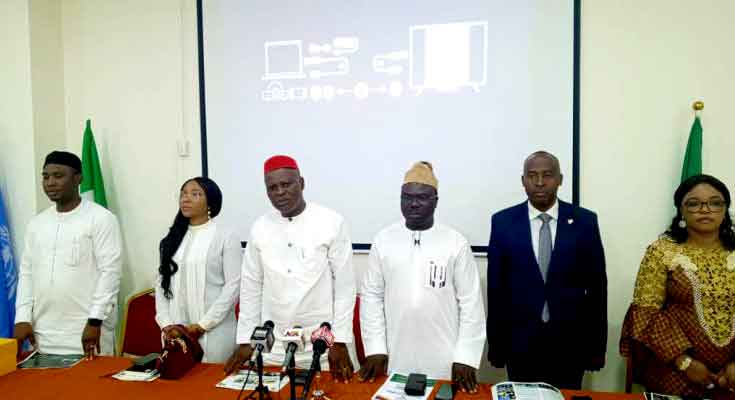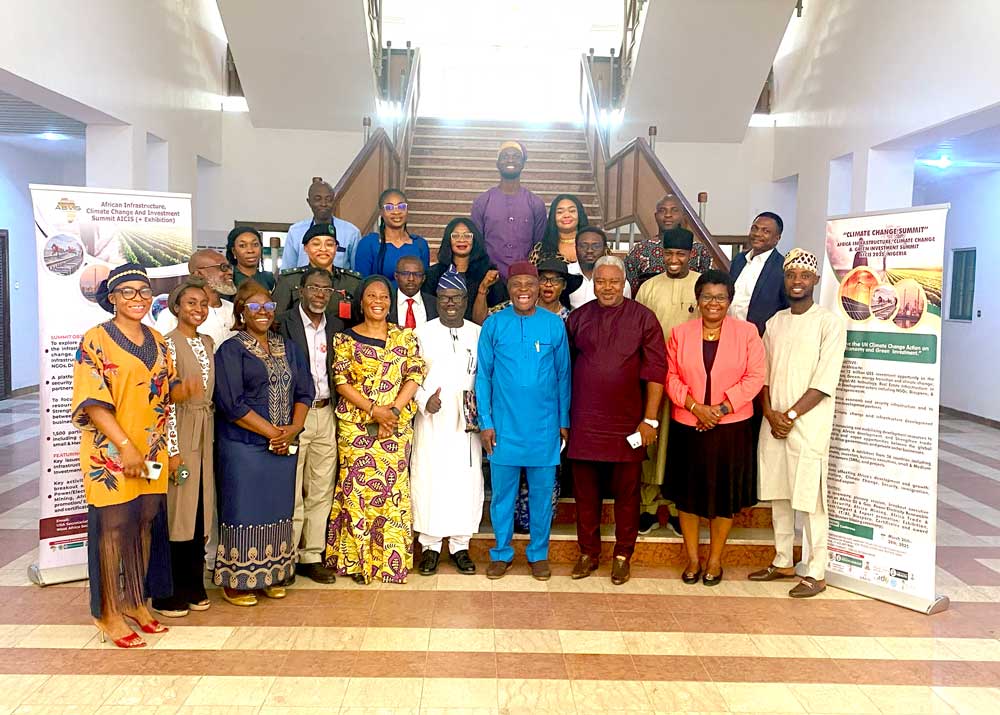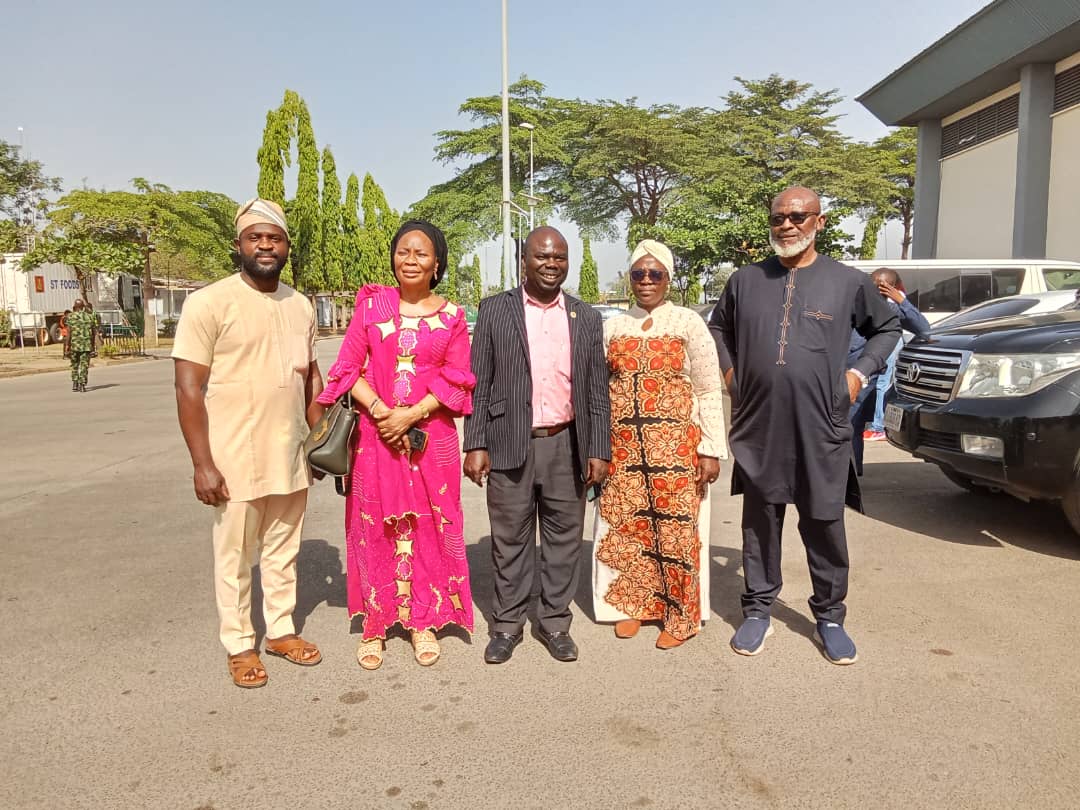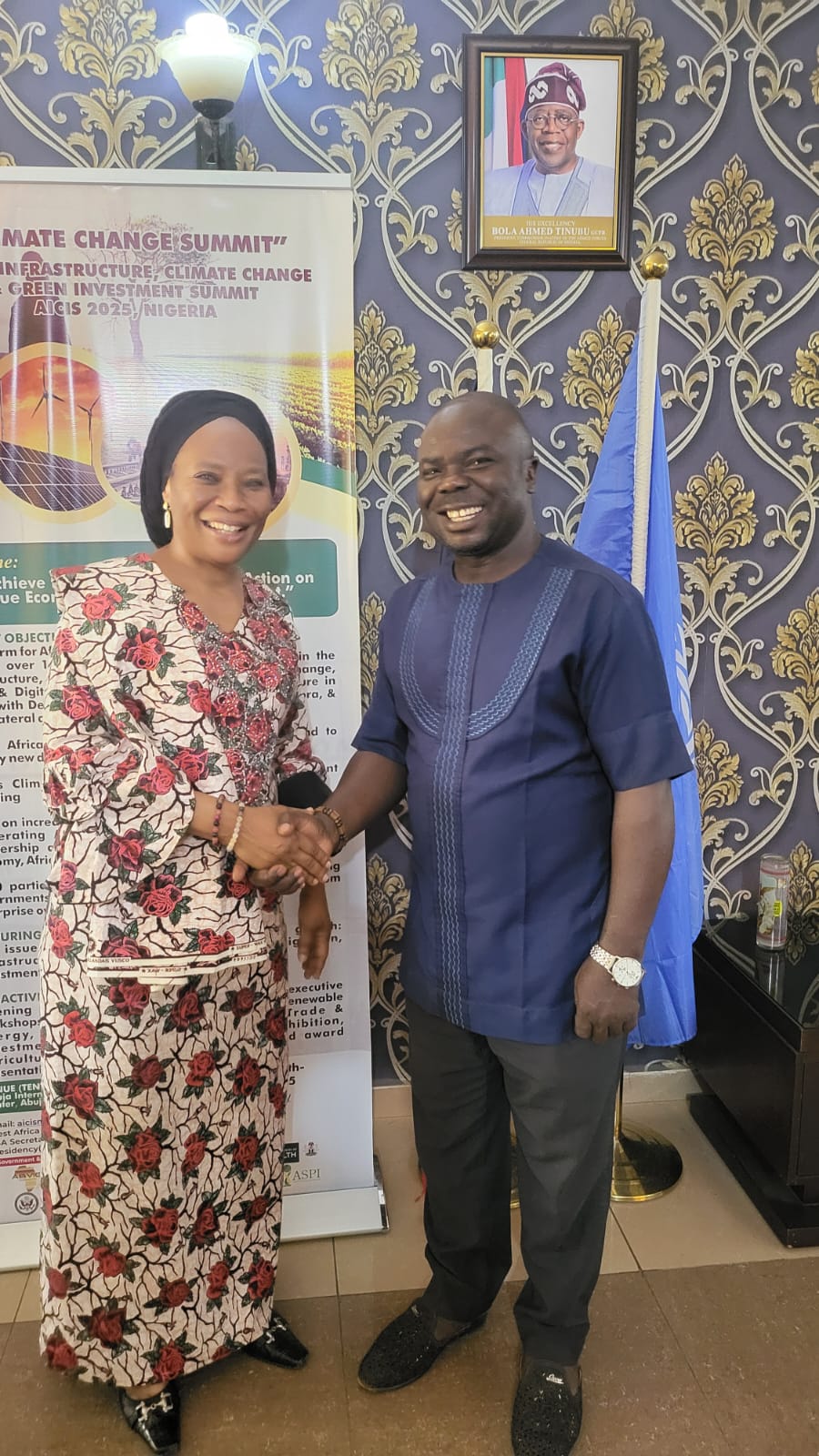Stakeholders in climate change and the environment, including the African Business Venture and Investment Group,
have reiterated commitment to infrastructural development of the country.
Speaking Friday in Abuja, during the launch of Nigerian Bilateral /Multilateral Infrastructure and Climate Change Summit 2025, Chairman, Africa Infrastructure, Climate Change and Investment Summit (AICIS) 2025, Planning and Organizing Committee, Hon Moses T. Owharo, said the Nigerian Multi-lateral, Infrastructure and Climate Summit will shape the future pathway of Africa’s development.
He said: “I wish to commend AICIS stakeholders, for their commitment and coordination of the first ‘Launch of Nigerian Multi-lateral, Infrastructure and Climate Change Summit & Business Excellence Award Breakfast. Thank you for coming and we welcome you all.
“The presence in such large numbers of your Excellencies. Ministers, Heads of Government ministries. departments and agencies, Heads of Diplomatic Missions, Ambassadors, captain of industries and development partners from around the world, says it all. Africa’s voice on climate change will resonate across the world.
“Africa has $6.5 trillion worth of natural resources, 65 percent of the world’s uncultivated arable land, and a vibrant youth population. However, recovery remains fragile due to the ever-growing complexity of societal problems, uncertain global economic conditions, growing debt service payments, frequent climate- related disasters, and escalating conflict and violence.
“The Nigerian Multi-lateral, Infrastructure and Climate Summit will shape the future pathway of Africa’s development, starting with Nigeria; that is why the Launch. AICIS POC decided this AICIS 2025 be held in Nigeria; considering Nigeria’s role in Africa and as a political and economic powerhouse in West Africa.
“The successfully held maiden edition of AICIS 2024 USA Summit’s objectives were implemented at various stages with network of committees to commence pre-event activities in Nigeria, maiden edition in USA and other programmes would also be held in China, Mexico, Germany and Nigeria.
“The AICIS 2024 Summit was initiated as part of the passionate effort of ABVIG Group and its strategic partners toward promoting and developing capacity of African countries to enable them to be among the key players in climate compliant development and green economy.
“It is also aimed at creating a medium where African nations and the United States of America could foster win-win synergies across key economic sectors especially infrastructure, natural resources optimization. and development, and harnessing the potentials of the continent’s human resources.
“Additionally, the event provided a strategic medium for mutual engagement among the public and private sector as well as civil society organizations to engage with one another on ways. our great continent of Africa can move to greatest heights and compete favourably in terms of development indices with other parts of the world.
“Today, we gather because the people of Africa expect us to act. We gather because the future of the youth of Africa is at stake. We gather because we must galvanize global actions on climate. We gather because our collective existence is at risk.”
He added: “Infrastructure development is a key driver for progress across the African continent and a critical enabler for productivity and sustainable economic growth. It contributes significantly to human development, poverty reduction, and the attainment of the Sustainable Development Goals (SDGs). Investment in infrastructure accounts for over half of the recent improvement in economic growth in Africa and has the potential to achieve even more; the need for adequate infrastructure-secure energy, efficient transport, reliable communication systems, resilient sanitation, and affordable housing is particularly apparent. Africa’s vast infrastructure deficit is a constraint on its growth, but also an opportunity to leapfrog to new, more efficient technologies.
“Climate change also is short-changing Africa. Droughts and floods have been increasing across the continent. No country is spared. As we gather today, if we strain our ears enough, we will hear the calls for urgency from farmers whose crops and livestock are being destroyed; the voices of fishing folks whose catch is reducing, and livelihoods are being imperilled; the voices of the youth whose future is being compromised, the voices of women and children who bear the brunt of climate change; the voices of economies unable to cope with the ever-rising costs of climate-induced shocks.
“We have a duty and responsibility to hear these voices and to act with a greater sense of urgency. At the global level, the developed economies must meet their commitment to provide funding annually in climate. finance. The global climate financial architecture must be changed to prioritize the needs of Africa. At the national level, we must accelerate actions on climate adaptation.
“Africa must develop with what it has, not what it does not have. Africa is blessed with the largest sources of natural resources in the world. But we cannot power Africa with potential. We must fully unlock Africa’s resources potential, to harness the benefits of these vast resources for 1.5 Billion people and we must be pragmatic.
“As we look COP29, Africa’s needs must be front and center. Powered by the leadership of our heads of state, our youth and private sector, and the voices of our communities, we must be the vuvuzelas of climate financing for Africa. Together with partners from around the world let’s make it happen for Africa.”
Speaking earlier, the Minister of Water Resources and Sanitation Engr. Prof. Joseph Terlumun Utsev, who was represented by the Director of Hydrology, Engr. (Mrs) Ngozi Abohwo, said that the Federal Ministry of Water Resources and Sanitation has shown a proactive approach in preparing for infrastructure development and climate change action, recognizing the urgency of the challenges of climate change.
“Climate change is probably the most topical global issue that has dominated public discuss at different international and national conferences, workshops, symposia and seminars. The reason is not far-fetched. This is because the impact of climate change is all around us that if we do not anything about it, we all stand the risk of being consumed. Climate change, which, some decades ago was seen as a far distant phenomenon has finally caught up with us faster than we have thought and it is posing an existential threat to countries all over the world including Nigeria.
“One of the sectors greatly affected by climate change is the water sector and its impact on the sector is significant. Water has been identified as the primary source through which man and the ecosystem feel the impact of climate change. The amount of emission from the water sector is quite huge especially when moving water from one location to the other or pumping water through the systems. The water sector, which includes water resources, supply, quality and infrastructure, is highly susceptible to changes in temperature, precipitation, flood and drought. These of course have far- reaching negative implications for human health and ecosystems.
“Let me take us a little bit down memory lane. President Bola Ahmed Tinubu while delivering the National Statement at the United Nations Framework Convention on Climate Change (UNFCCC) Conference of the Parties (COP) 28 in Dubai, in December 2023, spoke about the impact of climate change in Nigeria with desertification in the north and ocean surge in the south leading to loss of arable land, displacement of communities, food insecurity and social dislocation. He said the country is contending with the issue of development and climate change and reiterated that Nigeria will continue to do its part in fighting the climate menace.
“Let me state unequivocally that the Federal Ministry of Water Resources and Sanitation as one of the Ministries responsible for climate change mitigation and adaptation is not unmindful of these impacts. The Ministry has taken and will continue to take deliberate steps and actions to mitigate the impact of climate change on water resources and associated infrastructure.
“The Federal Ministry of Water Resources and Sanitation has shown a proactive approach in preparing for infrastructure development and climate change action, recognizing the urgency of the challenges of climate change. Recent policy initiatives and strategic plans, such as the Water, Sanitation, and Hygiene (WASH) Action Plan, PEWASH, the National Water Resources Master Plan, and the main report of the presidential committee on development of comprehensive plan of action for preventing flood disasters in Nigeria, all reflect the Ministry’s commitment to building resilient water and sanitation infrastructure.
“The quantum of energy required and amount of emission from the water sector is huge especially when moving water from one location to the other or pumping water through the systems. Consequently, it is very important to deploy more of renewable energy sources to the water sector in order to reduce the GHG Emission or Carbon Footprints. In this regard, the Ministry has launched the National Programme for Conversion of Diesel Powered Water Schemes (Irrigation schemes, Boreholes and Water Treatment Facilities) to renewable energy source. Thus, this project aims at inventory, rehabilitation and conversion of existing schemes designed using fossil fuel to renewable energy source based on energy available within each region of the country.
“In its bid to reduce the emission of greenhouse gases, which are the major drivers of climate change and to reduce flood with its attendant colossal loss and damages, the Ministry has commenced processes for the Construction of Small Hydropower Plants nationwide and the Datsin Hausa Dam. The Small Hydropower Project aims to retrofit existing Small Dams initially constructed for irrigation purposes with small hydropower systems.”
He added: “By utilizing the flow of water already managed by these dams, the project seeks to generate clean and renewable energy while at same time maintaining their primary function of providing water for agriculture. This approach enhances the sustainability and multi-functionality of existing irrigation infrastructure. The Datsin Hausa Dam Project located in Adamawa State upstream of Yola near the border with Republic of Cameroun on completion will; receive and contain the irregular release of water from the Cameroon Lagdo dam, provide for the irrigation of about 150,000 hectares of land and generate electricity of about 150MW
“In order to attract the required fund for climate projects financing, the Ministry has entered into funding arrangement with some international organisation including the World Bank and the United Nations. Such projects under the arrangement include the Greenbond, Agroclimatic Resilience in SemiArid Landscape (ACRESAL) and Sustainable Power and Irrigation in Nigeria (SPIN).
“The Green bond is specifically for projects with Climate Credentials and addressing various environmental concerns. The four irrigation projects under the Green Bond projects are to address both climate change adaptation and mitigation measures towards ensuring national food security. ACRESAL aims to reclaim degraded landscape deploy same for agricultural purposes.
“The Sustainable Power and Irrigation in Nigeria (SPIN) on the other hand proposes that Dam infrastructure should be designed, constructed, and operated to consider various co-benefits or multi-purposes, including generating electricity, storing drinking water and irrigation, protecting against floods, and preparing for droughts. It also advocates the participation of the Federal and State Governments, towards fully harnessing the irrigation potential of the existing water storage to achieve 500,000ha of irrigable land by 2030.
“I cannot conclude this remark without talking about flooding that is presently ravaging some states in the country. Flood is the most damaging natural disaster in Nigeria today and surprisingly, irrespective of the negative consequences of flood, it still has some positive implications. The Ministry is therefore looking at exploring the possibilities of utilisation of floodwater for food production in flood prone areas. The Ministry is also looking at deploying Public Private Partnership (PPP) to harness floodwater for national development.”




